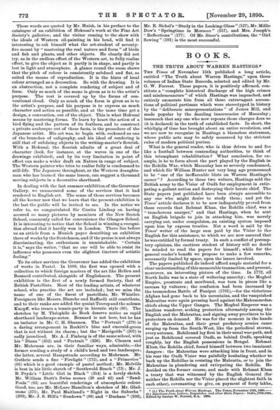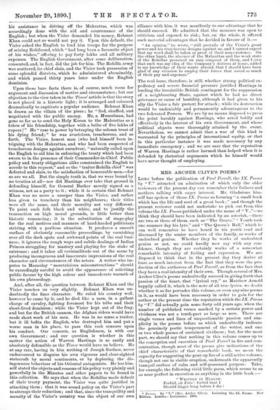BOOKS.
THE TRUTH ABOUT WARREN HASTINGS.* THE Times of November 15th published a long article, entitled "The Truth about Warren Hastings," upon three volumes of Indian State Records, selected and edited by Mr. G. W. Forrest. These papers, it is positively affirmed, con- stitute a "complete historical discharge of the high crimes and misdemeanours" of which Hastings was impeached, and entirely exonerate him from all those extravagant accusa- tions of political partisans which were stereotyped in history by the "deliberate misrepresentations" of James Mill, and. made popular by the dazzling inaccuracies of Macaulay,. insomuch that any one who now repeats those charges does so (it is declared) in the teeth of established facts. In short, the whirligig of time has brought about an entire revolution, and we are now to recognise in Hastings a blameless statesman,. whose public acts may be safely measured by the strictest rules of modern political purism.
What is the general reader, who is thus driven to and fro. like a football between contending authorities, to think of this triumphant rehabilitation ? What conclusion, for ex- ample, is he to form about the part played by the English in the Rohilla War, which Macaulay has so severely condemned, and which Sir William Hunter not very long ago pronounced to be "one of the ineffaceable blots on Warren Hastings's career " ? According to these two writers, Hastings sold the British army to the Vizier of Oudh for employment in extir- pating a gallant nation and destroying their heroic chief. The State papers just published have been always accessible to. any one who might desire to study them ; and yet the Times' article declares it to be now indisputably proved from these records that Rehmat Khan, the Rohilla chief, was a "treacherous usurper," and that Hastings, when he sent an English brigade to join in attacking him, was merely carrying out, under compulsion, an existing system imposed upon him by express treaties. Not a word is said by the Times' writer of the large sum paid by the Vizier to the English for this assistance, to which we are now assured that he was entitled by formal treaty. in such a conflict of peremp- tory opinions, the cautious student of history will no doubt be minded to read the papers for himself ; while for the general reader's benefit we propose to make a few remarks,. necessarily limited by space, upon the issues involved.
The papers published do indeed afford ample material for a clear understanding of this memorable transaction, and present,. moreover, an interesting picture of the time. In 1772, all North India was in a state of weltering anarchy ; the Moghul Empire, prostrate and moribund, was torn in pieces like a. carcass by vultures ; the confusion had been increased by the tremendous Battle of Paniput (1761),—for the victorious. Afghan had gone back to his mountains, and the vanquished Mahrattas were again pressing hard against the Mahommedam chiefs along the Upper Ganges. The Moghul Emperor was a landless wanderer, seeking protection alternately among the English and the Mahrattas, and signing away provinces to his protectors on demand. He was for the moment in the hands. of the Mahrattas, and their great predatory armies came surging up from the South-West, like the periodical storms,. every autumn. Rohilcund lay first in their usual war-path, and. just as Rohilcund covered Oudh, so behind Oudh, speaking roughly, lay the English possessions in Bengal. Rehmat Khan, the Rohilla chief, found himself between two imminent dangers : the Mahrattas were attacking him in front, and in his rear the Oudh Vizier was painfully hesitating whether to. back up the Rohillas in resisting the Mahratta, or to join the- Mahrattas in plundering and extirpating the Rohilla. He decided on the former course, and made with Rehmat Khan a treaty that was witnessed by the English General (for neither the Rohilla nor the Vizier placed the slightest faith in each other), covenanting to give, on payment of forty lakhs„
• 11.1 The Truth about Warren Hastings. The Tiniss,Norember 19th, 1890.- (2.) Selections from Letters, Despatches. and other State Papers India,17724785— Edited by George W. Forrest, E.A. 1890. his assistance in driving off the Mahrattas, which was accordingly done with the aid and countenance of the English; but when the Vizier demanded his money, Rehmat Khan could not or would not pay it. Upon this default, the Vizier asked the English to lend him troops for the purpose of seizing Rohilcund, which "had long been a favourite object of his wishes," offering to pay forty lakhs and all military expenses. The English Government, after some deliberation, consented, and, in fact, did the job for him. The Rohilla army was scattered, its chief slain, and the Vizier took possession of some splendid districts, which he administered abominably, and which passed thirty years later under the English dominion.
Upon these bare facts there is, of course, much room for argument and discussion of motive and circumstance; but our objection to the view taken in the Times' article is that the story is not placed in a historic light; it is arranged and coloured dramatically to captivate a popular audience. Rehmat Khan is drawn as the villain of the piece ; he "lied, shuffled, and negotiated with the public enemy. He, a Mussulman, had gone so far as to send the Holy Koran to the Mahrattas as a token of his friendship, together with a bribe of five lakhs of rupees!" He " rose to power by betraying the solemn trust of his dying friend;" he was avaricious, treacherous, and so forth. The Vizier, honest man (who had himself been in- triguing with the Mahra,ttas, and who had been suspected of treacherous designs against ourselves), "naturally called upon the English to aid him in enforcing the treaty which had been sworn to in the presence of their Commander-in-Chief. Public policy and treaty obligations alike constrained the English to accede to this request," and so the "traitor Rohilla chief" was defeated and slain, to the satisfaction of honourable men,—for so are we all. But the simple truth is, that we were bound by no treaties at all—nor did Hastings ever take that ground in defending himself, for General Barker merely signed as a witness, not as a party to it ; while it is certain that Rehmat Khan was no more a usurper than the Vizier, and rather less given to treachery than his neighbours ; their titles were all the same, and their morality not very different. To paint such folk black and white, and to justify the transaction on high moral grounds, is little better than historic romancing ; it is the substitution of stage-play for the real motives and manners of hard-headed politicians striving with a perilous situation. It produces a smooth surface of obviously reasonable proceedings, by varnishing over all the dark spots and awkward points of the real busi- ness; it ignores the rough ways and subtle dealings of Indian Princes struggling for mastery and playing for the stake of existence ; and it takes all verisimilitude out of the scene by producing incongruous and inaccurate impressions of the real character and circumstances of the actors. A writer who im- putes to Macaulay "meretricious misconstructions" should be exceedingly careful to avoid the appearance of soliciting public favour by the high colour and immoderate warmth of his own phraseology.
And, after all, the question between Rehmat Khan and the Vizier touches us very slightly. Rehmat Khan was un- doubtedly the finer character. He ruled his country well, however he came by it, and he died like a man, in a gallant charge of cavalry, fighting foremost for his tribe and their short-lived dominion ; while the Vizier kept out of the fray, and but for the British cannon, the Afghan riders would have made short work of his men. He was in no sense a traitor, but it ill befits the English, who destroyed him and put a worse man in his place, to pass this rash censure upon his conduct. Our concern, as Englishmen, is with our own Government ; and our question is whether in this matter the action of Warren Hastings is so easily and absolutely defensible as the Times would have us believe. He at any rate, having in him nothing of Joseph Surface, never endeavoured to disguise his own vigorous and clear-sighted statecraft by moral sentiments, or by deploring the dis- ingenuous behaviour of his Oriental antagonists. He has him- self stated the objects and reasons of his policy very plainly and powerfully in the Minutes and other papers to be found in this collection. He says that when the Rohillas made default of their treaty payment, the Vizier was quite justified in attacking them ; that it was sound policy on the Vizier's part to attempt their reduction; and that, since the tranquillity and security of the Vizier's country was the object of our own
alliance with him, it was manifestly to our advantage that he should succeed. He admitted that the measure was open to criticism and exposed to risk ; but, on the whole, it offered such material advantages that he decided in favour of it :—
"An opinion," he wrote, "still prevails of the Vizier's great power and his treacherous designs against us, and I cannot expect that my word shall be taken as proof of their non-existence. On the other hand, the absence of the Mahrattaa and the weak state of the Rohillaa promised an easy conquest of them, and I own that such was my idea of the Company's distress at home, added to my knowledge of their wants abroad, that I should have been glad of any occasion to employ their forces that saved so much of their pay and expenses."
The real issue, therefore, is still, whether strong political ex- pediency and severe financial pressure justified Hastings in lending the irresistible British contingent for the suppression of a neighbouring State, against which he had no direct grievance or cause of hostility, although it had given to his ally the Vizier a fair pretext for attack ; while its destruction would be undeniably and permanently advantageous to the two federated Powers. We are by no means disposed to press the point harshly against Hastings, who acted boldly and effectively in the interest of his own Government, and whose political objects were thoroughly attained by the event. Nevertheless, we cannot admit that a war of this kind is warranted by the principles of international equity, or that in this particular instance it was made necessary by any immediate emergency ; and we are sure that the reputation of Warren Hastings is rather harmed than helped when it is defended by rhetorical arguments which he himself would have never thought of employing.











































 Previous page
Previous page